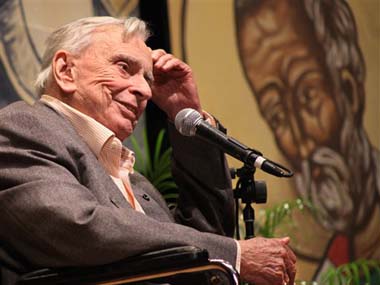Gore Vidal, who passed away on Wednesday, was considered “America’s most provocative writer”, straddling the twin worlds of literature and political science with equal passion. He counted former President Jimmy Carter and another “elected President” Al Gore (“Technically, he did win the 2000 elections,” Vidal would say) as cousins, and himself ran for Presidency on a New Left platform. [caption id=“attachment_399646” align=“alignleft” width=“380”]  Gore Vidal. AP[/caption] At the height of the Cold War, in the 1960s, he controversially campaigned for cutbacks in Pentagon spending, and called for the recognition of China, then a full-fledged Communist dictatorship. The corpus of his written work of several decades spans a wide genre — novels (including historical fiction), essays and plays. Even those who don’t agree with his views on American’s place in the world — and there are many who didn’t — will acknowledge his peerless contributions as a thinker and litterateur. Vidal’s opinions always had verve, acerbity — and the capacity to provoke. I met Vidal in Hong Kong a few years ago on the sidelines of a literary festival. In that conversation, Vidal, who for long advocated a non-interventionist foreign policy for the US, gave trenchant expression to the civilisational crisis that haunts America today. On the Bush presidency and the Iraq war: We’ve had had silly wars, disastrous wars, before, but this is the most appalling thing to ever happen to the US. He (Bush) hasn’t a clue what is going on anywhere. Our tax money goes to knock down states that have done us no harm, and immediately (Vice-president Dick Cheney’s) company gets the contracts. It’s like a coup d’etat on the people… It’s worse than flag-burning; this is Constitution-burning. (The Bush administration) has got rid of the 700-year-old habeas corpus provision, which is the basis of the legal system. My grandfather (former Senator Thomas Pryor Gore) used to say: “This country is about four words: Due process of law. Without that we are nothing.” We are getting there, we are nothing now. On the level of intellectual freedom in the US: The major media entities in the country are so shackled, we really don’t have a country. If the amount of energy that the New York Times has spent to keep people from reading Norman Mailer and Gore Vidal —to choose just two people from my generation — were channelled, you can light up a city. Thomas Jefferson said, “If I had to choose between government without newspapers and newspapers without government, I would always choose newspapers.” Nobody can say that today. They’ve been bought; they’ve been had. They get the candidate they want, and the people have nothing to do with it at all. Oh, of course, every four years you’re asked to vote, but God knows there’s no discussion of issues. They’ve made lunatics of half the population. On China’s rise: I’m reminded of Confucius, and the mandate of heaven that emperors had. That mandate fell to us (the US) in 1945. We were the masters of the earth, which is far more than any Chinese emperor had ever enjoyed. And then we did everything wrong, and now we’re at the end of it. And the mandate of heaven has come back here (to China). On the greatest moment of his life: The one thing that Cassandras like to be is to be right.So, I think the numerous times that I’ve been able to say, “I told you so”… I’ve enjoyed that.
In remembrance of an encounter with Gore Vidal, arguably America’s most provocative writer.
Venky Vembu attained his first Fifteen Minutes of Fame in 1984, on the threshold of his career, when paparazzi pictures of him with Maneka Gandhi were splashed in the world media under the mischievous tag ‘International Affairs’. But that’s a story he’s saving up for his memoirs… Over 25 years, Venky worked in The Indian Express, Frontline newsmagazine, Outlook Money and DNA, before joining FirstPost ahead of its launch. Additionally, he has been published, at various times, in, among other publications, The Times of India, Hindustan Times, Outlook, and Outlook Traveller. see more


)

)
)
)
)
)
)
)
)



